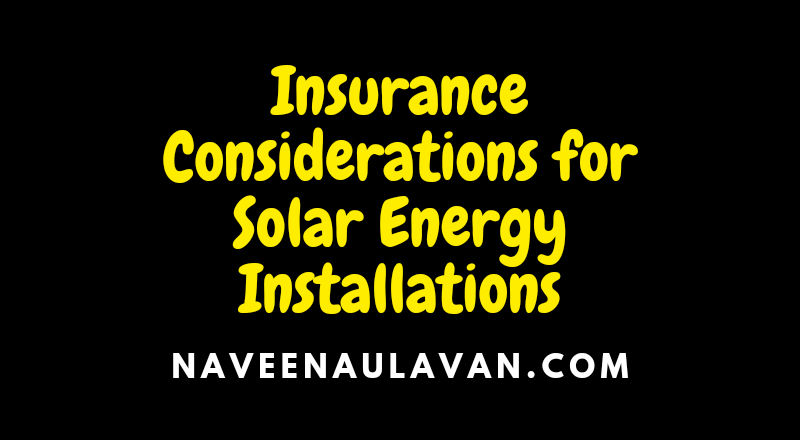As the demand for renewable energy sources continues to grow solar energy installations have become increasingly popular. Solar panels are an attractive solution for homeowners and businesses looking to reduce their carbon footprint and save on energy costs. However like any other type of investment solar energy installations come with potential risks that need to be addressed. One crucial aspect to consider is insurance coverage. In this article we will explore the insurance considerations for solar energy installations.
The Importance of Insurance Coverage
Solar energy installations involve a significant investment of time effort and money. They come with unique risks that need to be managed appropriately. Insurance coverage is crucial for protecting this investment and mitigating potential losses.
Property Insurance
One of the primary insurance considerations for solar energy installations is property insurance. Property insurance typically covers damage to the solar panels caused by perils such as fire windstorm or vandalism. It is important to review the property insurance policy to ensure that solar panels are explicitly listed as covered property.
Some property insurance policies may not automatically cover solar panels considering them as detached structures. In such cases homeowners or businesses should inquire with their insurance provider about adding an endorsement to the policy to cover the solar panels adequately. Additionally it is essential to review the policy limits and deductibles to ensure they are sufficient to cover the potential cost of replacement or repairs.
General Liability Insurance
General liability insurance is another critical consideration for solar energy installations. This coverage protects against claims for bodily injury or property damage caused by the solar panels or associated equipment.
For residential solar installations general liability insurance coverage is typically included in the homeowner’s policy. However it is essential to confirm this with the insurance provider and ensure that the coverage limits are adequate.
For commercial installations separate general liability insurance should be obtained to cover potential liabilities arising from the solar energy system. This coverage should extend to cover any installation-related activities such as maintenance or repairs.
Specialized Coverages
In addition to property and general liability insurance there are several specialized coverages that any solar energy installation owner should consider.
Business Interruption Insurance
Business interruption insurance provides coverage for lost income and extra expenses resulting from interruptions in the operation of the solar energy system. This coverage is particularly important for businesses that heavily rely on solar energy for their operations.
If a covered event such as a fire or severe weather damages the solar panels and causes a loss of power generation business interruption insurance can help compensate for the resulting income loss and additional expenses incurred while repairing or replacing the system.
Performance Guarantee Insurance
Performance guarantee insurance protects against a decline in the energy output of the solar panels compared to the estimated or guaranteed performance. This coverage is typically provided by the manufacturer or installer and can help ensure the financial performance of the solar energy system.
Performance guarantee insurance may be necessary for commercial installations that rely on specific energy generation targets to secure financing or meet contractual obligations. Reviewing the warranty or contract terms is crucial to understanding the scope and duration of the performance guarantee coverage.
Contractor’s Insurance
If solar energy installations are performed by a contractor or subcontractor it is essential to verify that they carry adequate insurance coverage. This includes both general liability insurance and workers’ compensation insurance.
Contractors’ general liability insurance should explicitly cover the solar energy system installation protecting against potential property damage or bodily injury arising from their work. Workers’ compensation insurance is necessary to protect the contractor’s employees in the event of on-the-job injuries or accidents.
Claims Process
In the unfortunate event of damage or loss to a solar energy system understanding the claims process is vital for a swift and successful resolution. Here are some key steps to follow:
1. Contact the insurance provider: Report the incident and file a claim as soon as possible. Provide all necessary documentation including photographs of the damage and any relevant invoices or receipts.
2. Assessment of the damage: An insurance adjuster will assess the extent of the damage and estimate the cost of repairs or replacement. It is important to cooperate with the adjuster and provide any requested information.
3. Repair or replacement: Once the claim is approved the insured can proceed with repairing or replacing the solar energy system. It is advisable to coordinate closely with the insurance provider to ensure compliance with any specific requirements or procedures.
4. Reimbursement: After the repairs or replacement are completed the insured should provide the insurance provider with all the relevant invoices and receipts to finalize the claim. The insurance provider will then reimburse the insured for the covered costs subject to any applicable deductibles.
Conclusion
Proper insurance coverage is essential for protecting the investment and managing the risks associated with solar energy installations. Property insurance general liability insurance and specialized coverages such as business interruption insurance performance guarantee insurance and contractor’s insurance should not be overlooked. Understanding the claims process can help ensure a smooth resolution in the event of damage or loss. By addressing the insurance considerations outlined in this article homeowners and businesses can enjoy the benefits of solar energy installations with peace of mind.
